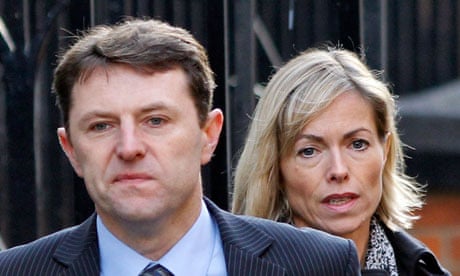Gerry McCann is to reveal on Monday that he and his wife, Kate, fear they have "relived our darkest days" needlessly in the vain hope that new legislation would be introduced to control the press.
"Leveson without the law is meaningless," the father of missing Madeleine McCann will tell a Westminster audience at a conference for politicians and the victims of media intrusion.
His speech, which will call for speedy legislation to implement the recommendations made by Lord Justice Leveson at the end of his nine-month inquiry, comes in the wake of a poll seen by the Observer showing that almost three-quarters of the public agree with him.
Conducted by YouGov for the Media Standards Trust, the poll also indicates an even bigger proportion – 83% – want more distance between politicians and the media, or at least greater transparency about the relationship, while another substantial majority would like immediate government action to control the press.
McCann will address hacking victims and members of parliament, expected to include culture secretary Maria Miller, at the Hacked Off Victims Conference.
"Kate and I had the misfortune to suffer from everything the press could throw at us," the doctor will tell his audience.
"The reason we subsequently agreed to the ordeal of giving evidence to the Leveson inquiry was that we don't want anyone else to have to go through what we went through.
"The Leveson package, including legal underpinning, is the minimum acceptable compromise for us and, judging by the polls, for the public at large. Leveson without the law is meaningless."
Supporters of the campaign group Hacked Off, including Charlotte Church, Hugh Grant and the falsely accused Bristol teacher Christopher Jefferies, believe the government has blocked parliamentary attempts to enact the recommendations of the inquiry report.
"When the prime minister promised to protect those who have been 'picked up and thrown to the wolves' by this process, we hoped for real change," McCann will say.
"The idea that Kate and myself, and the other victims, might have relived our darkest days in the full glare of the media for no good reason is just galling."
The YouGov poll found that, like McCann, 73% of the 2,030 adults surveyed last month would have "not much" or "no" confidence in a new system of voluntary press regulation with no legal backing. And 73% of respondents also said they believe that meetings between politicians and senior media figures should be made public, while only 10% said they should not.
The Media Standards Trust, a charity lobbying for reform and press accountability, believes the poll gives more weight to the argument that the government has now consulted widely enough. The poll the trust commissioned shows that 64% of those asked favour the introduction of a new regulatory system within 12 months or sooner.
"This poll shows that the public overwhelmingly support implementation of Leveson, and do not have confidence in a system set up by the press without proper independent oversight. There's a real fear that, if things do not change substantially, the same illegal and unethical practices will recur," said the director of the Media Standards Trust, Dr Martin Moore.
"The public also want politicians to become a lot more transparent, and not revert to the cosy relationships they enjoyed before the Leveson inquiry."
Supporters of press legislation took heart last Tuesday when peers unexpectedly passed an amendment to the Defamation bill to introduce one of Leveson's key recommendations – a simple arbitration service between newspapers and those who feel wronged.
Use of an arbitration service would be voluntary and form part of the newspaper industry's own self-regulatory system, but the amendment would allow courts to vary costs and damages depending on whether the service has been used.
MPs and ministers who do not wish to accept the Lords amendment will now have to overturn the planned legislation in the Commons.
Meanwhile, the chair of the Press Complaints Commission, Lord Hunt of Wirral, is meeting newspaper editors to decide how to respond to the recent changes to the bill.

Comments (…)
Sign in or create your Guardian account to join the discussion